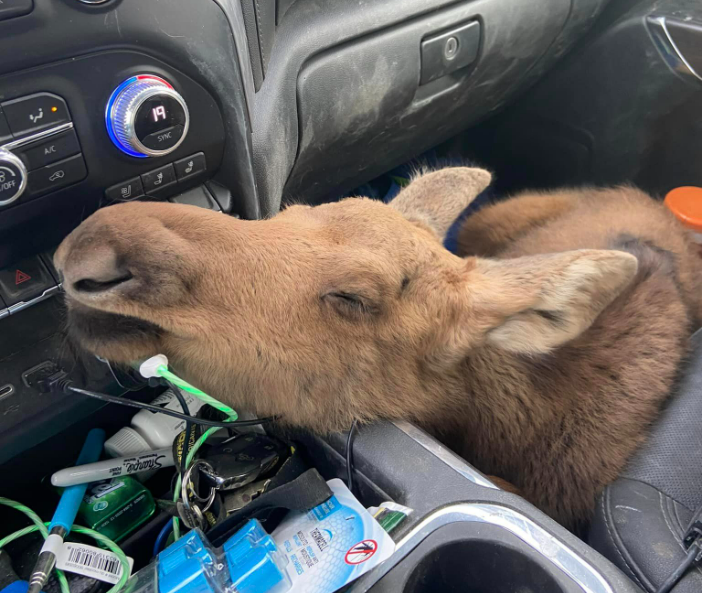If Mark Skage could turn back the clock, he said he would still rescue “Misty,” a young moose calf, from the side of a northern British Columbia highway in early June.

The Fort Nelson man, an experienced outdoorsman, said he found the calf — unaccompanied by her mother — on June 6, about five-and-a-half hours’ drive north of the community on the Alaska Highway.
He brought “this little gal” back to town to a farm, and eventually, the B.C. Conservation Officer Service (COS) was able to bring her south to a permitted wildlife rehabilitation facility in Dawson Creek.
Yet his efforts, which involved the use of his work truck, have now cost him his job, Skage told Global News on Saturday.
“I believe that in this world, we need to stand up for our values and beliefs, and do what we think is right regardless of the consequences,” he said.
“No harm came to that moose, no harm came to that company pickup truck, no harm came to anybody else along the way.”

Skage’s story has received much attention on social media. In a July 4 post, he shared photos and video of the calf and announced his employment was terminated because he brought her back to Fort Nelson in his work truck.
Skage said when he first saw the calf, he initially pulled over with the goal of scaring it back into the bush, but it crossed the road and approached him, appearing interested in climbing into the vehicle. His video shows the calf crossing the highway, walking up to the open vehicle door and poking its head in, as he asks it, “Where’s mom?”

Get breaking National news
Shortly afterward, Skage said he noticed a black bear in the direction the calf had come from and that’s when his attitude shifted to, “I needed to help.”
“It didn’t want to be outside no more,” he explained. “She came to me and I decided I’d answer the call.”

As soon as Skage had driven Misty into an area with cellphone service, he said his first phone call was to the B.C. COS and the second one was to his supervisor, to inform them of what had happened.
He lost his job as a tank technician little over a week later, he said.
In an emailed statement, his employer, AFD Petroleum, said two-way video from inside the work truck shows no evidence of a bear in the area and does not appear to show Skage searching thoroughly for the calf’s mother.
That video, shared with Global News, shows Skage picking the moose up and putting it in the truck, and contains an audio recording of Skage making a phone call telling someone he knows about the calf.
“AFD is deeply disappointed that a human resources matter has become part of the public record but is compelled, on behalf of our team, to respond specifically to our former employee’s allegations,” wrote Dale Reimer, company president.
“We take our obligation to wildlife and to our natural environment extremely seriously. The only actions which put the animal in danger were those of Mr. Skage.”
Contrary to Skage’s statement, Reimer claimed Skage did not contact the COS. Further, he said all AFD staff are required to undergo training on human resources policies and procedures, including protocols for interacting with wildlife.
Skage completed that training and “understood he was acting inappropriately.” His termination was the result of a series of “workplace incidents culminating with this incident,” Reimer said.
“We are working with the relevant provincial authorities and will provide them with any information they may require, including the two-way video footage of the incident taken from the employee’s vehicle,” he wrote.
By email, the B.C. COS confirmed it is investigating the circumstances around “the alleged unlawful possession of a moose calf near Fort Nelson.” The calf is still at the rehabilitation centre in Fort Nelson, it added.
“The individual was advised about the legalities of possessing live wildlife,” it wrote.
It said it couldn’t comment further on the matter as the investigation took place.
According to the B.C. Wildlife Act, it is illegal to be in possession of — or to transport — wildlife without a licence or permit, or outside of the circumstances allowed under the law.
Skage said he knows the rules, but did what he believes was “something higher.” Under any other circumstance, he added, he would not have picked up the animal, aware that “at times, it is more effective and more helpful to just leave those critters.”
“Even if they thought I didn’t do the exact right thing, I think they realize there was nothing nefarious about what I did and my intentions were just to help,” Skage said.
He said he knew about the two-way camera in the truck and disagreed with any assertion that he put himself, the animal or other motorists on the road at risk.
According to a 2002 article published in the Journal of Wildlife Management, predation was responsible for 92 per cent of all moose calf deaths in Eastern Interior Alaska, with black bears making up 45 per cent of the kills.








Comments
Want to discuss? Please read our Commenting Policy first.